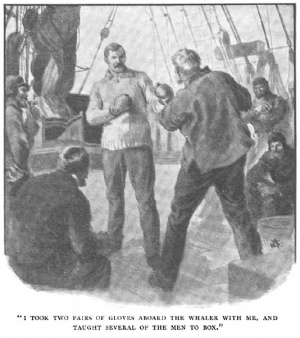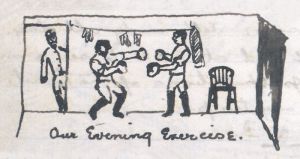Boxe
From The Arthur Conan Doyle Encyclopedia


Arthur Conan Doyle enjoyed boxing very early. In his student days boxing was his favorite amusement. Aged 21, he boxed the steward of the Hope in Arctic. He wrote many fictions where boxing is the main topic. He made Sherlock Holmes a fine boxer (see description).
In The Old Horse drawing, Arthur Conan Doyle placed Boxing on top of his souvenirs.
Conan Doyle about Boxe
- « In my student days boxing was a favorite amusement of mine, for I had found that when reading hard one can compress more exercise into a short time in this way than in any other. Among my belongings, therefore were two pairs of battered and discolored gloves. Now, it chanced that the steward was a bit of a fighting man, so when my unpacking was finished he, of his own accord, picked up the gloves and proposed that we should then and there have a bout. I don't know whether Jack Lamb still lives - but if he does I am sure that he remembers the incident. [..] As to his boxing, he practised with me every day, and became a formidable opponent — especially when there was a sea on, when, with his more experienced sea-legs, he could come charging down with the heel of the ship. » (Life on a Greenland Whaler, 1897)
- « I have always been keen upon the noble old English sport of boxing, and, though of no particular class myself, I suppose I might describe my form as that of a fair average amateur. I should have been a better man had I taught less and learned more, but after my first tuition I had few chances of professional teaching. However, I have done a good deal of mixed boxing among many different types of men, and had as much pleasure from it as from any form of sport. It stood me in good stead aboard the whaler. On the very first evening I had a strenuous bout with the steward, who was an excellent sportsman. I heard him afterwards, through the partition of the cabin, declare that I was "the best sur-r-r-geon we've had, Colin — he's blacked my ee." It struck me as a singular test of my medical ability, but I dare say it did no harm. ... » (Some Recollections of Sport, 1909)
- « Of one thing I am certain. The present course of action will never success in exterminating boxing in England. The only success that the enemies of the sport can hope for is to drive boxing down — to force it into the interior of national life. At the present most boxing is on the surface, it is more peculiar than ever — look at the recent championships, when there were something like 250 entries — and boxing manifests are given the widest publicity. Boxing — the love of boxing — is in the blood of the people; it is part of national character; and so long as the character remains as it is at present, will have boxing contests. The attempt to make boxing scene may be successful; but, as I have said you will never succeed in exterminating it. If such an attempt were successful, it would be bad for the manhood the country — bad for the nation at large. » (Boxing Favored by Prominent Britons, 1911)
- « I had always taken an interest in boxing, though my own form in it was only fair. It is not generally known that I was asked referee the Johnson-Jeffries fight in America. I considered the proposal carefully, but I did not feel inclined to travel thousands of miles, and possibly to, have to face a hostile demonstration from the supporters of the beaten man, whichever it might be. » (Author and Sportsman, 1920)
- « I was present at the fight at Olympia, and saw Milligan beaten by Walker. It was the first fight I had been for years, for, although I am fond of boxing, and was once a pretty useful heavy-weight. » (Replies to Sir Hall Caine, 1927)
Letters
Articles
- Log of the S. S. Hope (1880)
- Life on a Greenland Whaler (1897)
- Some Recollections of Sport (1909)
- Boxing as a Sport (1911)
- Boxing Favored by Prominent Britons, by Marquis of Queensberry (1911)
- A Manly Sport: Sir Arthur Conan Doyle Defends Boxing (1911)
- The Wells-Carpentier Fight (1913)
- Author and Sportsman (1920)
- Memories and Adventures (1923)
Fictions about Boxe
- Rodney Stone (1896)
- The Croxley Master (1899)
- The Crime of the Brigadier (1899)
- The Lord of Falconbridge (1909)
- The House of Temperley (1909)
- The Fall of Lord Barrymore (1912)
- Borrowed Scenes (1913)
- Three of Them V. About Naughtiness and Frogs and Historical Pictures (1918)
- The Bully of Brocas Court (1921)
- Tales of the Ring and Camp (1922)
- The Forbidden Subject (1923)
- The End of Devil Hawker (1930)